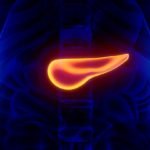Carrying a lot of excess weight is undeniably unhealthy. It can increase the chance of developing numerous conditions including type 2 diabetes, cardiovascular disease, and certain cancers. You may think of these problems as something that takes a very long time to develop, occurring during the senior years or maybe in middle age if you’re unlucky. But new research indicates you can throw that thinking out the window. In the case of obesity-related cancers, the risk is on the rise even in young adults.
The study, which took place at the Surveillance and Health Services Research Program of the American Cancer Society in Atlanta, Georgia, found that several forms of cancer known to be associated with obesity have been increasing in people between the ages of 25 and 49.1Sung, Hyuna; et al. “Emerging cancer trends among young adults in the USA: analysis of a population-based cancer registry.” The Lancet. 3 February 2019. Accessed 13 February 2019. http://www.thelancet.com/journals/lanpub/article/PIIS2468-2667(18)30267-6/fulltext#%20. These results are based on an evaluation of data collected in the cancer registries of 25 states, representing 67 percent of the United States population. The researchers focused on 30 common types of cancer, of which 12 are known to be related to obesity and that were diagnosed between 1995 and 2014.
Among young adults ranging in age from 25 to 49, the rates of several of those obesity-related cancers increased during the study period. These included cancer of the colon, gallbladder, kidney, pancreas, thyroid, and uterus, as well as multiple myeloma (a cancer of the plasma cells in the blood).
The rate increases varied by cancer types. While it rose less than one percent annually in cases of uterine cancer, the increase was as high as three percent for kidney cancer in subjects between the ages of 45 and 49. Even worse were the statistics discovered in participants between 25 and 29, for whom the annual increases ranged from one percent for cases of multiple myeloma to six percent for kidney cancer.
What’s more, the average annual rate of cancer is rising more quickly among younger people than older ones, even if the overall rate is still lower. So, for pancreatic cancer, as one example, the average increase was approximately one percent in participants ranging in age from 40 to 84, but 1.3 percent in those between the ages of 35 and 39, almost three percent in those between the ages of 30 and 34, and four percent in those between the ages of 25 and 29.
In other words, while the total risk of developing any one of these kinds of cancer is still relatively low in people in their 20s, 30s, or 40s, the risk is clearly climbing much faster than it should be. And when considered cumulatively, the risk of developing some form of obesity-related cancer in your youth can no longer be dismissed. Since these cancers are all known to have a common risk factor of obesity, it makes perfect sense why they would be on the rise in younger adults. That’s because the rate of obesity has been steadily increasing since the late 1970s in the United States.2Craig M. Hales, Margaret D. et al. “Prevalence of Obesity Among Adults and Youth: United States, 2015–2016.” NCHS Data Brief No. 288 October 2017. http://www.cdc.gov/nchs/data/databriefs/db288.pdf In the years covered by the study period, the rate of obesity in the United States went from roughly 15 percent in 1995 to nearly 28 percent in 2014 and 39.8 percent in 2016—rising considerably among those under 50.
Obviously, obesity is not the only risk factor for any of these kinds of cancer, but it is one that is very much within our control. Therefore, to lower your risk, it is essential to lose excess weight. Eating a healthy diet based on fish, fruits, nuts and vegetables—such as that outlined in the particular form of the Mediterranean diet that Jon Barron advocates—can help you manage your weight and was shown in a 2015 study at IRCCS-Istituto di Ricerche Farmacologiche in Milan, Italy, to significantly reduce the likelihood of developing uterine cancer.
Another reason that obesity is so prevalent nowadays is because far too many people live a sedentary lifestyle. Approximately 28 percent of American adults get no regular exercise. But a daily workout can make a huge difference, helping you to lose weight and cutting your cancer risk substantially. If you’ve been inactive, start off small by committing to taking a 10 or 15 minute walk every single day and increase your stamina and exercise routine from there.
References
| ↑1 | Sung, Hyuna; et al. “Emerging cancer trends among young adults in the USA: analysis of a population-based cancer registry.” The Lancet. 3 February 2019. Accessed 13 February 2019. http://www.thelancet.com/journals/lanpub/article/PIIS2468-2667(18)30267-6/fulltext#%20. |
|---|---|
| ↑2 | Craig M. Hales, Margaret D. et al. “Prevalence of Obesity Among Adults and Youth: United States, 2015–2016.” NCHS Data Brief No. 288 October 2017. http://www.cdc.gov/nchs/data/databriefs/db288.pdf |











